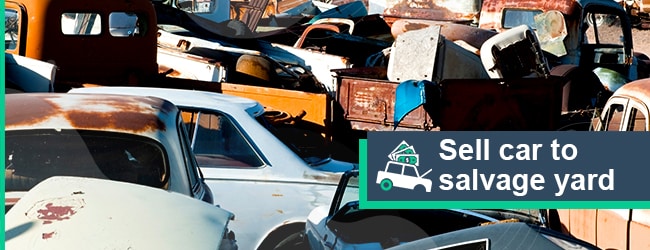Quick Answer:
To sell your car to a salvage yard, first obtain the vehicle’s title and ensure it’s in your name. Next, contact local salvage yards to gather offers or apply for instant cash offers via online salvage yards: Peddle, Wheelzy, and Carbrain.
Once you’ve chosen a buyer, arrange for vehicle pickup or delivery and finalize the sale by transferring the title and receiving payment.
Key Takeaways:
- Get quotes from multiple sources to get the best possible price.
- Consider selling valuable parts separately, such as a new battery. This can add extra money to your pocket.
- If you cannot drive your car to a salvage yard, choose a yard that offers free towing. Note that online car-buying websites usually provide free towing.
Best for Older & Damaged Cars

Buys used, damaged or junk cars
Free tow and no hidden fees
Pays by ACH trasfer or check
Top Pick for Junk Cars

Free, no-obligation cash offers
Offers free paperwork service
Pays on the spot upon pick up
When Should I Sell a Car to Salvage Yard?
If your car is no longer roadworthy due to significant damage or mechanical issues, it may be a good time to sell it to a salvage yard.
Key signs it is time to sell your car to a salvage yard:
- Var is undrivable, and the cost of repairs exceeds the vehicle’s current value.
- The car fails to meet inspection or registration criteria due to extensive rust, damage, or mechanical issues.
- The vehicle is over 15 years old, diminishing its appeal to private buyers.
- Damage from accidents or floods is significant, and comprehensive insurance coverage is not available for repairs.
- The car has high mileage, which greatly reduces its resale value.
- The vehicle was in an accident and has been officially declared a total loss.
As long as you have a clear title to your vehicle, the most reputable scrap yards will buy any make and model regardless of condition or mileage. You just need to weigh their offer against other alternatives.

How to Sell a Car to an Online Salvage Yard?
Online scrap yards and car buyers make it fast and easy to get quotes and schedule a vehicle pickup.
Benefits of selling a car to an online salvage yard:
- Fast Payment Process: Usually, you’ll get paid within 24 to 48 hours after accepting an offer.
- Easy process: Simply share your car’s details and condition.
- Minimal Paperwork: Regardless of state paperwork requirements, only your car’s Title is needed.
- Secure Payment Options: Choose between cash or check payment, minimizing fraud risks.
- No Hidden Fees: There are no extra costs like listing or platform fees.
- Free Towing: The company provides a free towing service from a location of your choice.
Some of the online car-buying websites that will offer you a good deal for your salvage car:

How to Sell a Car To a Traditional Salvage Yard?
1. Find Out Your Car’s Value
Check resources like Kelley Blue Book or Edmunds to find prices for your vehicle in your local market.
These tools use your vehicle’s make, model, year, mileage, and condition to determine its overall market value.
Knowing your car’s value allows you to judge salvage yards’ offers better and helps you guide the negotiations.
Remember, salvage yards tend to pay well below market price since they are scrapping/parting out vehicles.

2. Prepare the Title
In order to sell your car to a salvage yard, you will need to provide the vehicle’s title as proof of ownership.
In case you misplaced your vehicle’s title, you can reach out to your state’s DMV or BMV and request a duplicate title to be mailed to you.
Since the salvage vehicle is no longer registered for use on the road, you will not need to carry out a safety inspection, emissions inspection, or any other mandated processes.
3. Prepare Your Car
Thoroughly clean out the interior and trunk to remove all personal belongings and items you wish to keep. This includes phones, audio equipment, chargers, sunglasses, important paperwork, and any other loose items.
Also, remove any external parts you may want to sell separately, like custom wheels and tires, stereo components, or chrome accents. Leaving belongings inside often leads to lost items, so take the time to clear out anything you want to remove properly.
4. Contact Local Salvage Yards
Search online directories and business listings for salvage yards located in your area. Identify at least 3-4 reputable businesses to contact for quotes.
When calling or inquiring online, provide details like make, model, year, condition, and mileage so the salvage yard can assess the potential resale value of parts.
The more salvage yards you get quotes from, the better chance you have of maximizing your payout through price comparison and negotiation.
5. Compare Offers
Once you gather quotes from all salvage yards contacted, compare your offers side-by-side.
Evaluate not just pricing but also additional factors like:
- Paperwork requirements
- Type of offered payment
- Towing or transportation fees
- Business reputation
- Customer service quality
Ideally, you want to select the best total dollar amount as well as an established salvage yard with a straightforward and highly rated process.
6. Schedule Pickup and Complete The Sale
If your vehicle is undriveable, you will need to decide on a pickup time and location that is convenient for you. The salvage yard will dispatch a tow truck to haul your car to their facility.
If your car can still be safely driven, simply deliver it to the salvage yard once you have agreed on pricing and sale.
Once you transport the car or at the time of its pickup, an employee will look over and inspect the vehicle to ensure everything matches what was quoted over the phone.
They will then have you sign the paperwork and title, legally transferring ownership over to them. Make sure you are paid and receive a receipt at this time as well.
Count the payment carefully before handing over your keys and releasing the car. Get copies of all paperwork.
7. Sign the Bill of Sale
When the sale is complete, even if not mandated by your state, both you and the salvage yard representative should sign a bill of sale to document the transaction details.
Reasons to sign a bill of sale when selling a car to a salvage yard:
- Liability Shielding: Without this document, you might be held responsible for future problems or incidents involving the car once it’s sold.
- Legal Clarity: Specify that the car is sold “as is” in the bill of sale to prevent any post-sale legal complications.
- Sale Verification: A bill of sale acts as formal legal proof of the vehicle’s transfer to the new owner.
- Documentation for Records: This document offers a comprehensive record of the sale, noting the sale date, price, and contact details of both parties, which is helpful for tax reporting or sale confirmation.
8. Notify DMV
Contact your local DMV or motor vehicle agency to notify them you sold your car to an auto salvage yard.
Provide details like the business’ name and resale license number so the DMV can update their records.
This protects you in case the salvage yard fails to handle title transfer paperwork properly after acquiring your car.
9. Cancel Insurance
Once the vehicle changes ownership, call your auto insurance company to cancel your policy to avoid paying unused premiums.
Supply details like sale date, salvage yard details, and confirmation that you no longer own or drive the car.
Turn in license plates if required by your state. Insurance cancellation finalizes the full vehicle transfer process.
How Much Can You Expect To Get?
A junk car’s cash value in scrap is mostly based on its weight and recyclable metal. If your car still has valuable parts, you will sell it for more. There are, however, steps you can take to ensure you get top dollar for your car;
- Keep track of current scrap prices and stay informed.
- Don’t wait as it only makes your salvage car less valuable as parts continue to wear out.
- Ensure you get more if your car is drivable.
- Do not accept a price that comes with conditions.
The below table provides price ranges for cars that are not driveable and do not have salvageable parts:
| Car Size | Price range |
|---|---|
| Small cars | $100-$200 |
| Full-size cars | $150-$300 |
| Heavy vehicles such as trucks | $300 – $500 |
Additional factors boosting value are newer model years, popular makes/models with interchangeable parts, and working expensive parts like transmissions or electronics.
High-mileage vehicles in poor condition get a bottom dollar.
How to Sell a Car to Salvage Yard Without the Title?
In order to sell a car to any salvage yard, you will need to provide proof of ownership. The car’s title is the most common document required by most salvage yards, but you will need to inform the salvage yard of this beforehand if you no longer have the car’s title. Also, confirm if they accept other forms of documentation that establish proof of ownership.
Some salvage yards may accept the following documents as proof of ownership;
- An auction sales receipt
- A Car registration
- A Storage lien
- Mechanic’s lien
- Repossession affidavit
It’s best to find out what the salvage yard will accept as proof of ownership when contacting them to sell your car. This will provide you with a hassle-free experience.

Sell Expensive Parts Separately
It takes effort, but you can score extra cash by removing valuable tires, batteries, alternators, catalytic converters and electronics to sell independently before the salvage yard pickup. Even mundane parts can yield profits in the used auto parts market.
Parts that are in highest demand:
- Engines and Transmissions: the heart and backbone of a vehicle.
- Battery and Hybrid Components: these are especially relevant for electric and hybrid vehicles, including components like batteries and electric motors.
- Catalytic Converters: contain precious metals such as platinum, palladium, and rhodium.
- ECUs and Other Electronic Components: The Electronic Control Unit (ECU) and vital electronic components manage many car functions.
- GPS and Infotainment Systems: advanced infotainment systems with navigation and other features.
- Airbags: critical safety components in vehicles.
- Wheels and Tires: premium brand wheels and tires in good condition.
- Bumpers and Fenders: play a significant role in a car’s aesthetics and protection.
Bets places to sell car parts:
- eBay Motors
- Craigslist
- Facebook Marketplace

What Questions to Ask at the Salvage Yard?
To protect yourself during the transaction, get clear answers on:
- Proof of business legitimacy, like license numbers
- Payment forms/types accepted
- Vehicle inspection process and criteria
- Any stipulations for providing tow truck access
- Paperwork needed to finalize the sale and transfer ownership
Transparent salvage yards readily share this information. Be wary if details seem murky.
Salvage Yard vs Junkyard?
These terms are sometimes used interchangeably, but some key differences exist:
Junkyards
- Focus on selling parts from damaged/end-of-life vehicles
- Allow buyers to walk the yard and remove their own parts
- Typically buy vehicles outright to dismantle for parts sales
Salvage Yards
- Specialize in repairing and reselling damaged repairable vehicles
- Have mechanics restore vehicles before auctioning for a rebuilt title
- Often act as holding yards for insurance auto auctions
Salvage Yard Alternatives
If you want to purge a car without selling it to a salvage yard, other options exist:
Donate: Charities like Goodwill or Salvation Army accept donated cars and handle sales. You get a tax break.
Sell Privately: Marketplaces like Facebook and Craigslist connect local buyers for private sales if vehicles remain roadworthy.
Recycle/Dispose: If a car sits neglected, some municipalities contract tow companies to remove and recycle abandoned vehicles for free once legally classified as abandoned.





